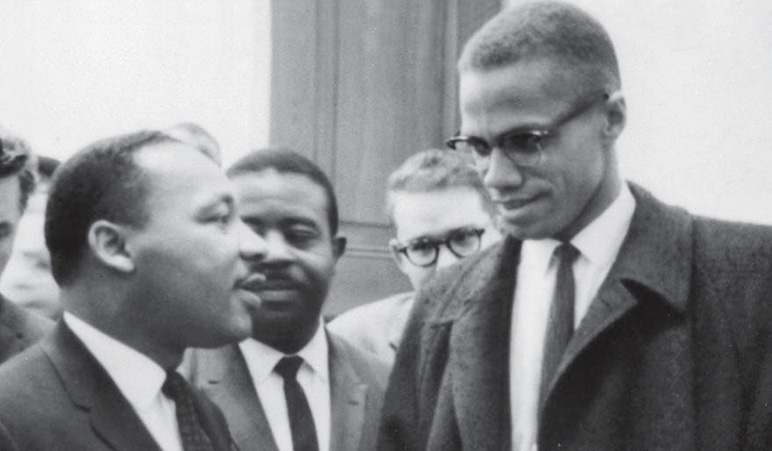Malcolm X is arguably one of the most important people in African American religious and political thought. He was a man heavily influenced by his own personal experiences and the historic moment into which he was born. Along with the societal hardships that accompanied being Black in America when Jim Crow discrimination was enforced by law, Malcolm’s family endured racial violence. His life trajectory began to be characterized by his rejection of the society that had rejected him. This landed him in prison, where he was converted to the Nation of Islam.
On release from prison, Malcolm rose in the ranks of the Nation of Islam and spread the message of Elijah Muhammad across America. His ministry developed in the context of the civil rights movement and was characterized as the violent alternative to the peaceful solutions that Dr. Martin Luther King Jr. offered the nation.
Many who have rejected Malcolm’s social philosophy unfairly have interpreted him as a preacher of wanton violence against White people. However, this has left them susceptible to the charge of hypocrisy because there are elements within his ethic of violence that many Christians would defend if applied to their own lives.
Malcolm’s ethic of violence has at least three essential parts: self-defense, revolutionary, and retaliatory. A full theological examination of each of these exceeds the limitations of this article. However, one can conclude that Christian ethics allows for violence in the act of self-defense. Contrarily, Malcolm’s advocacy of retaliatory violence conflicts with biblical Christianity. Rather than softening the critique of Malcolm, I believe that this strengthens the argument against his philosophy because its precision protects the apologist from condemning what God allows. Therefore, African Americans should reject Malcolm’s teaching on retaliation because it conflicts with biblical Christian ethics.
This Postmodern Realities episode is a conversation with Journal author Jimmy Butts about his Volume 40 #6 feature article “Malcolm X and the Christian Ethic of Violence.”
We’d also like to invite you to subscribe to the Journal. To subscribe to the Journal, please click here.
When you to subscribe to the Journal, you join the team of print subscribers whose paid subscriptions help provide the resources at equip.org that minister to people worldwide. These resources include our free online-exclusive articles, such as this review, as well as our free Postmodern Realities podcast.
Another way you can support keeping our resources free is by leaving us a tip. A tip is just a small amount, like $3 or $5, which is the cost for some of a latte, lunch out, or coffee drink. To leave a tip, click here.
Other articles and podcasts related to this topic:
Hank Unplugged Episode Black Hebrew Israelites with Vocab Malone
The Origin and Insufficiency of the Black Hebrew Israelite Movement
Spirituality in Modern Hip Hop: The Theology of Kendrick Lamar and Chance the Rapper
Postmodern Realities Episode 063: Black Panther Film Review with Eric Redmond
Film Review: The Church without Claws? A Figurative Reading of the Film Black Panther
Is The Black Man God? Challenging the Central Claim of the Nation of Islam
Five Apologetics Lessons from the Writings of Martin Luther King Jr.
Putting Race in Biblical Perspective
Christianity and Black Slavery
Martin Luther King, Jr.’s, Legacy
